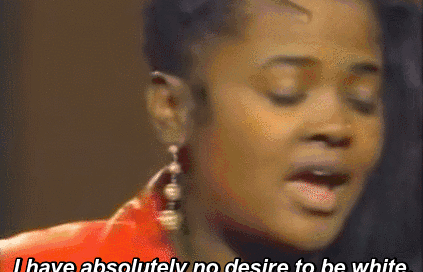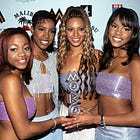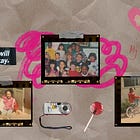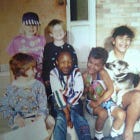When I was in the fifth grade, I was the only Black girl in my class. This should come as a surprise to no one who knows that I am from the frosty state of Minnesota, whose racial demographic is as white as the snow it infamously produces. Still, this was a significant era in my personal development that could’ve shaped me into someone radically different than who I am today. In fifth grade, you are usually ten or eleven years old, approaching or enduring the awkwardness of puberty, self-expression, and understanding your identity. My fifth-grade year was during the late 90s when Black art, media, and culture were mainstream but slowly beginning to fade into the background. I was in a classroom where the topic of discussion was whether you liked The Backstreet Boys or *NSYNC— while living in a household where we listened to Blackstreet and En Vogue.
Prior to fifth grade, I’d experienced other instances where I became aware of my Blackness — and, by nature of living in Bloomington, Minnesota, my otherness. It happened in the form of one of my neighborhood friends calling me the n-word and a group of white boys spitting in my hair, unprovoked, on the playground when I was in second or third grade. The latter incident was one of the few memories I have of my father, who just happened to be around that day, acting like a father. I remember telling him, “It’s okay, mom just bought me new shampoo today.” — my childhood innocence did not register that this was done to me on purpose, let alone because of the color of my skin. My father responded by saying, “Don’t ever let nobody disrespect you like that.” In retrospect, I can see why that was one of the few instances that moved him to be the protector I needed, for once. He was a Black man from the South who migrated north with his family, like so many others, and escaped racial traumas I could not fathom.
My understanding of identity became much more complex in the fifth grade. I was not just Black— I was a pre-teen girl, and being a girl had evolved beyond the desire to play with Barbies over Tonka trucks. At ten years old, being a girl meant being pretty, stylish, and desirable. At the time, I didn’t have the language to articulate the desirability aspect of girlhood, but I felt it all the same. If elementary school was my introduction to racism, middle school became my first encounter with misogynoir. The two Black boys in my class regularly made fun of my looks, specifically my nose, which has always been big. I remember sitting alone in my bedroom, reading issues of CosmoGIRL!, wishing I had a small nose like every single woman and girl featured in the magazine. Surely, something was wrong with me if I didn’t have the same features as all of the girls who were worthy of being in a magazine and taking up space in the world. It didn’t help that the two Black boys in my class were obsessed with the white girls in my class or that nobody seemed to admire or have a crush on me. Not to mention, a couple of my family members also taunted me about my features. This was the year I started to seriously consider getting a nose job when I got older.

And then, there was the complexity of my hair. Fifth grade was also the year I got my first relaxer. Despite protests from my Aunt Linda, who often braided my hair and thought a relaxer would break all of it off (and it did), my mom took me to the hair salon to get one because she was tired of combing and pressing my hair every week. I think in her mind, I was also outgrowing the braids and bobbles combo that most little Black girls wear until they reach a certain age. After getting a relaxer, I was pretty much left to my own devices to figure out how to do my hair, something I still, at this big age, barely know how to do. During this period, the popular girls in my class wore messy buns on the top of their heads with GAP hoodies, Abercrombie t-shirts, and brown Dr. Martens 8053s. I wanted that look so bad, but GAP and Abercrombie were out of the question; we were a JCPenney family. However, my mother compromised by buying me the Payless version of those Doc Martens— close enough.
I will never forget the day I thought I had finally mastered the look. I put my relaxed hair (which was stiff from too much Pink Lotion in an attempt to make it shiny) into a “messy” bun that was actually just a hot ass mess. I remember my mother was in the kitchen talking with my aunt that day. I walked into the room, and they stopped mid-conversation to size me up, which, if you know anything about Black moms catching up with Black aunties, is quite rare. In true Black mom and Black aunt fashion, they humbled me: “Girl, what do you have on, and what did you do to your head!?” If I felt shame, it was only for a millisecond. They were adults. They didn’t know what was cool. I went to school with my new hairstyle and knock-off Doc Martens, and nothing changed. I kept getting picked on, but this time, it was worse. It had become obvious that I knew that I did not fit in because I looked ridiculous trying to, and in my attempt to be like everyone else, I made myself even more othered. It wasn’t long before I started to have outbursts in class and was forced to take an anger management class. One of the administrators at my school considered putting me in a “special education” class for children with behavioral issues. At no point did anyone consider how the environment I was navigating influenced my behavior.

My mother noticed the changes happening in me that year and, in true Capricorn mom fashion, took action. I was never raised to be ashamed of my identity. I had the kind of mother who put those framed art prints you can find at certain Black beauty supply stores or cultural fairs of Malcolm X, Dr. King, and Harriet Tubman in my bedroom. All of my Barbies (my favorite toy) were Black. My mother was a Mary J. Blige listening, Tupac rapping, Alizé sipping, ZigZag papers in a shoebox top rolling, not-to-be-fucked-with Black woman who just barely made it out of the hood. I spent all of my holidays and occasional weekends with an extended family whose brand of Blackness ranged from hood af to sanctified Black Christians but never whitewashed. Yet, none of that was enough to keep me from being sucked up by white beauty standards and cultural norms.
When the school year was over, my mom decided to send me to the YMCA for a predominately Black day program for youth in South Minneapolis. This is where my world shifted from centering whiteness to appreciating my Blackness. None of the kids in this program cared about Britney Spears or Christina Aguilera. It was all about Destiny’s Child and The Cash Money Millionaires. We went swimming every week, so mercifully, my mom made me get braids, and I wasn’t picked on about my hair. I also wasn’t made to feel like I was ugly. In fact, I vividly remember a field trip to the movies where three boys fought over who got to sit next to me. I even had a boyfriend (all we did was hold hands and sit by each other on the school bus, lol). I had gone from being an ugly duckling to being that girl simply by taking a 20-minute drive to a place where more kids looked like me. I attended that program for two more summers. By the time I was gearing up for eighth grade, I had outgrown a lot of the awkwardness and sense of inferiority I had internalized earlier in my pubescent journey.

I’m sure that most non-white people can relate to some parts of this story, even if they come from different backgrounds, but the ways we are imprinted by formative pressures to assimilate are as varied and complex as our idiosyncrasies. What we absorb from our influences speaks to how we have contextualized the spaces we occupy. I know that my context, as a child of a low to middle-class (depending on the economy) single-parent household, is different than other marginalized people who come from nuclear families and/or upper-class backgrounds. Social class affords more proximity to whiteness because it provides access to things that, historically, only white people were allowed to have. It makes sense then that it’s common for people who have more material privileges than I did to consider whiteness a standard for behavior, expression, and personal achievement, and I would not. White acceptance feels accessible to them, even if only on the most superficial level. From the tender age of ten, I knew it would never be accessible, so I adjusted accordingly.
It may sound dramatic, but I often wonder who I would be right now if my mom had not made that decision. Though fifth grade was a weird time for me, there are still parts of the girl I was in that very white classroom that I keep with me. I listened to Britney Spears's memoir on Spotify and went to the Renaissance World Tour. Some of the first CDs I owned were Whoa, Nelly! by Nelly Furtado and Country Grammar by Nelly, which reflects the eclectic musical palette I still have today. These experiences taught me to parse out my interests more authentically, and I started to get to know who LaChelle was underneath how I was perceived or expected to perform. Another day I will never forget is when I invited one of my friends from the YMCA summer program to my house, let’s call her LaShawna. We were watching MTV, and the “Oops, I Did It Again” music video came on. I busted out into full choreography, and LaShawna fell over on the floor, laughing at me (LaShawna turned out to be an opp, but that’s a story for another day). I was a little embarrassed, but I LOVED Britney. It was another instance that made me feel othered, but over time, it morphed into a sense of individuality that I take pride in.

Last week, there was a Substack post circulating on notes that I had a lot of opinions about. The long and short of it is that some BIPOC folks have struggled to find their authentic voice on a platform that seemingly prioritizes, centers, and rewards white voices and people who mimic them. It’s perplexing that writers, specifically, struggle to find their authenticity because I believe that writing is the greatest tool to seek inner truths. It is through personal reflections like this essay and journal entries, as well as the writing of people I identify with, that have provided the language to articulate the complexities of the world I’m navigating in this body and with his skin color. It’s not the job of writers to appeal to broad audiences by having the most palatable voice, at least not writers who have overlooked experiences the world could stand to learn more about. A writer's job is to be fearless, look uncertainty straight in the eye, and approach a blank page as an altar, a space to seek divine guidance. We are vessels, and our words are a manifestation of our capacity to deconstruct and reimagine the frameworks created by those who oppress us.
Even if you are not a writer or don’t have a parent who proactively deconditioned you, it is your responsibility to nurture and protect all facets of your identity. Failure to do so is a form of self-abandonment that leaves you vulnerable to erasure. Your entire world opens up when you unapologetically embrace yourself, take up space, and center what and who centers you. You are more mindful of the company you keep, the media you consume, and the voices you value or are inspired by. You will sharpen your ability to cut through the sound of white noise (pun intended) and become less willing to be diminished by any bullshit rhetoric that tells you that you are inferior. It can sometimes be exhausting and lonely because nobody will do this work for you. But it’s worth it because it fortifies your center of gravity and keeps your feet on the ground so that the next time something or someone attempts to sweep you up into that machine of white cultural homogenization, you can easily say, “Nah, I’m good.”
If you liked this post you may also like…
Catch me on these digital streets.
Watch My Short Film “One Of The Guys” 🎥
Instagram 🤳🏾
TikTok ⏰
Website 👩🏾💻
Merch 🛍️
💋 ✌🏾
With love,
LaChelle









Girl I had to DM you on IG with a voice note to tell you how much this piece touched me! Sis all I can say right now is I’m so grateful we crossed paths. This hit home, this was my life and my mama also wasn’t going to let me be whitewashed, I was there for the education nothing else. This piece TOP TIER!
Whew! The black-tween-messy-bun-trauma to eclectic, unapologetic writer pipeline is soo real!🙏🏽🙌🏽